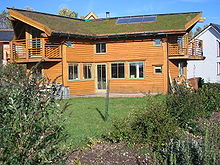
Back Ekodorp Afrikaans قرية بيئية Arabic Экапаселішча BE-X-OLD Ecovila Catalan Ekovesnička Czech Økosamfund Danish Ökosiedlung German Οικοκοινότητες Greek Ekovilaĝo Esperanto Ecoaldea Spanish
This article is written like a personal reflection, personal essay, or argumentative essay that states a Wikipedia editor's personal feelings or presents an original argument about a topic. (May 2024) |



| Part of a series on |
| Anti-consumerism |
|---|
An ecovillage is a traditional or intentional community that aims to become more socially, culturally, economically and/or environmentally sustainable. An ecovillage strives to have the least possible negative impact on the natural environment through the intentional physical design and behavioural choices of its inhabitants.[1][2][3][4][5][6] It is consciously designed through locally owned, participatory processes to regenerate and restore its social and natural environments. Most range from a population of 50 to 250 individuals, although some are smaller, and traditional ecovillages are often much larger. Larger ecovillages often exist as networks of smaller sub-communities. Some ecovillages have grown through like-minded individuals, families, or other small groups—who are not members, at least at the outset—settling on the ecovillage's periphery and participating de facto in the community. There are currently more than 10,000 ecovillages around the world.[7]
Ecovillagers are united by shared ecological, social-economic and cultural-spiritual values.[8] Concretely, ecovillagers seek alternatives to ecologically destructive electrical, water, transportation, and waste-treatment systems, as well as the larger social systems that mirror and support them. Many see the breakdown of traditional forms of community, wasteful consumerist lifestyles, the destruction of natural habitat, urban sprawl, factory farming, and over-reliance on fossil fuels as trends that must be changed to avert ecological disaster and create richer and more fulfilling ways of life.
Ecovillages offer small-scale communities with minimal ecological impact or regenerative impacts as an alternative. However, such communities often cooperate with peer villages in networks of their own (see Global Ecovillage Network (GEN) for an example). This model of collective action is similar to that of Ten Thousand Villages, which supports the fair trade of goods worldwide.
The concept of the ecovillage has undergone significant development over time, as evidenced by the remarkable growth and evolution of these communities over the past few decades. The various facets of the ecovillage include case studies of community models, discussions on sustainability alignment for diverse needs, examinations of their environmental impact, explorations of governance structures, and considerations of the challenges faced on their path towards a successful ecovillage.
- ^ Ulug, Ciska; Horlings, Lummina; Trell, Elen-Maarja (2021). "Collective Identity Supporting Sustainability Transformations in Ecovillage Communities". Sustainability. 13 (15): 8148. doi:10.3390/su13158148.
- ^ Casey, Katherine; Lichrou, Maria; O’Malley, Lisa (2020). "Prefiguring sustainable living: an ecovillage story". Journal of Marketing Management. 36 (17–18): 1658–1679. doi:10.1080/0267257X.2020.1801800.
- ^ Caves, R. W. (2004). Encyclopedia of the City. Routledge. p. 209.
- ^ Xue, Jin (2014). "Is eco-village/urban village the future of a degrowth society? An urban planner's perspective". Ecological Economics. 105: 130–138. Bibcode:2014EcoEc.105..130X. doi:10.1016/j.ecolecon.2014.06.003.
- ^ Schwab, Anne-Kathrin; Roysen, Rebeca (2022). "Ecovillages and other community-led initiatives as experiences of climate action". Climate Action. 1 (1): 12. Bibcode:2022CliAc...1...12S. doi:10.1007/s44168-022-00012-7.
- ^ Fonseca, Renata Amorim Almeida; Irving, Marta de Azevedo; Nasri, Yasmin Xavier Guimarães; Ferreira, Graciella Faico (2022). "Sustainability and social transformation: the role of ecovillages in confluence with the pluriverse of community-led alternatives". Climate Action. 1 (1): 23. Bibcode:2022CliAc...1...23F. doi:10.1007/s44168-022-00022-5.
- ^ "Ecovillages as an ecological alternative". Iberdrola. Retrieved 2020-08-21.
- ^ Van Schyndel Kasper, D. (2008). "Redefining Community in the Ecovillage." Human Ecology Review 15:12–24. Retrieved on July 28, 2018.